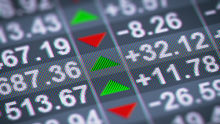
Although equity performance has been fairly lackluster lately, investors should not desert equity markets as they are still expected to outperform bond markets in 2016, according to a report by Toronto-based CIBC World Markets Inc. released on Thursday.
“Our top-down earnings model, which looks at indicators like economic growth and resources prices, points to 10% growth in earnings for the [Toronto Stock Exchange] in the next four quarters,” says Avery Shenfeld, chief economist with Canadian Imperial Bank of Commerce (CIBC) and co-author of the report, in a statement. “While slow economic growth may indicate middling equity market performance, now is not the time to sell given that alternative cash and bond yields are so abysmally low.”
The analysis finds Canadian and U.S. equity markets are expected to deliver modest but positive real returns thanks to a slight improvement in commodities prices, marginally better overall gross domestic product growth and the benefits of a weaker Canadian dollar on foreign earnings.
The CIBC World Markets report acknowledges that its estimate for 10% growth in the Canadian financial market trails the more optimistic views of other analysts who have cited growth of 20%-30% in 2016.
“The analyst consensus is simply capturing an out-of-date set of estimates for energy sector earnings that are still in the process of a reality check downgrade,” the report argues.
There is also some hope for Canadian non-resources stocks, according to Shenfeld: “On a forward [price/earnings] basis, Canadian non-resources stocks are now at historically cheap levels relative to comparable stocks on the S&P 500, which suggests these could outperform those in the U.S. in coming quarters.”
In looking at U.S. equities, the report states that a cyclical adjusted price/earnings ratio is consistent with an annual nominal return of approximately 5% in the decade ahead. CIBC World Market’s research anticipates an annual real price return of 1%, which will be assisted by a dividend yield of approximately 2% and average inflation of 2%.
“[It’s] nothing to really cheer about, but not a huge reason to sell given that alternative cash and bond yields are so abysmally low,” the report states.